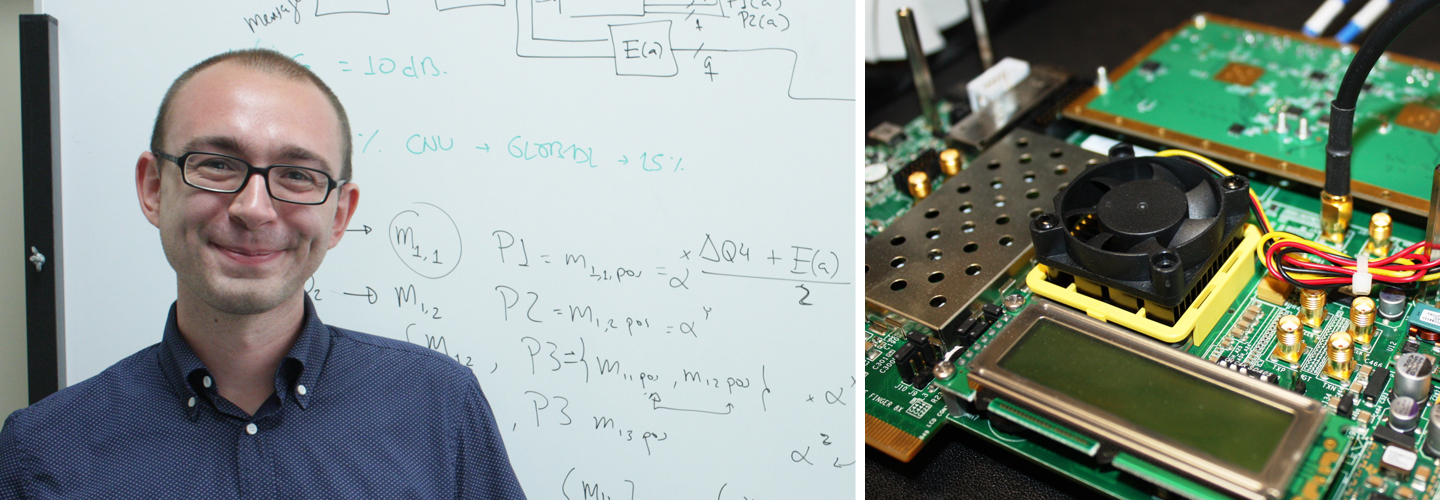Francisco Miguel García Herrero, Gandia local and undergraduate student in Telecommunications in the Campus Gandia, is the recipient of one of the Extraordinary Doctorate Award granted by the UPV in 2015, for his dissertation entitled “Architectures of soft-decision decoding of non-binary codes”. The thesis, supervised by Professor Javier Valls from the Campus Gandia, develops a line of research to improve communications and make them more efficient.
The work developed by García Herrero in his dissertation enables the implementation of communication systems or data storage with greater capability for error correction than the current ones and can operate at high speeds, in the order of various gigabits per second.
ALGORITHM WITH HIGH CAPACITY FOR ERROR CORRECTION AND LESS COMPLEXITY
Errors occur in all communications systems (television, wireless networks, internet) when transmitting information over the communication channel (air, cables, optical fiber). These errors also occur when reading the data stored on storage systems (DVDs, CD’s, flash memories). To recover the stored or transmitted information without errors, redundancy is added. This means that other data will be included and later be used in the receiver equipment or equipment that reads the information from the storage system, to correct the errors that have been produced. The receiver “decodes” the information received, running what are called error correction algorithms.
The advances made in this dissertation consist of the development of decoding algorithms for error correction with high correction capabilities, greater than those of the algorithms implemented in existing communications systems. It has also managed to reduce their complexity, thus enabling their implementation with current manufacturing technologies of integrated circuits (chips), reaching high decoding speeds, in the order of several gigabits per second.
INTERNATIONAL DOCTORATE AND EUROPEAN PATENT
Francisco Miguel Garcia, who has received several awards during his academic career, was able to carry out his thesis research thanks to the Ministry of Education, Culture and Sports’ highly competitive University Faculty Training (FPU) Grant. During his research he has also carried out academic residencies at the University de Cergy Pontoise (UCP-France) and the University of California (Davis-USA). These residencies and other aspects of his research are what have made his dissertation worthy of an international mention.
In addition, as a result of the research carried out in collaboration with the French university, a European co-ownership of patent was filed with the name: Method for decoding non-binary codes and corresponding decoding apparatus. The patent consist of a decoding method and a corresponding decoder for the NB-LDPC (Non-Binary Low-Density Parity Check) codes.
A BREAKTHROUGH THAT CAN BE INTRODUCED IN FUTURE STANDARDS OF COMMUNICATION OR DATA STORAGE
Improvements in error correction systems will be a major impact on the future development of communications systems and data storage. For example, in a communications system you will be able to increase the transmission distance while maintaining the same transmission power, and in a storage system you will be able to store more bits in the same-sized storage media. By demonstrating that these powerful error-correction algorithms can be implemented using current technology, the young researcher from Gandia has made great strides in their eventual incorporation in future communication or data storage standards.
YOUNG RESEARCHERS FROM CAMPUS GANDIA RECIPIENTS OF THE UPV EXTRAORDINARY AWARD FOR THEIR DOCTORAL DISSERTATION
- 2015 Pau Alonso-Monasterio Fernández
- 2014 Miguel García Pineda
- 2012 Javier Estornell Cremades
- 2009 Eva Antonino Daviu
- 2007 Jaime Lloret Mauri and Samuel Morillas Gómez
